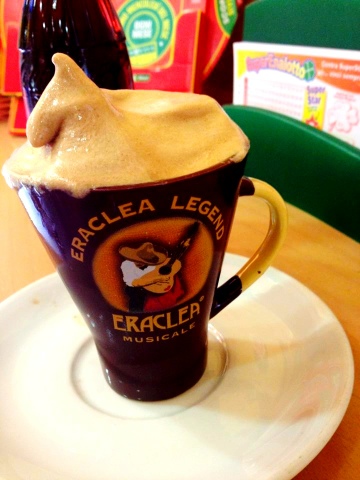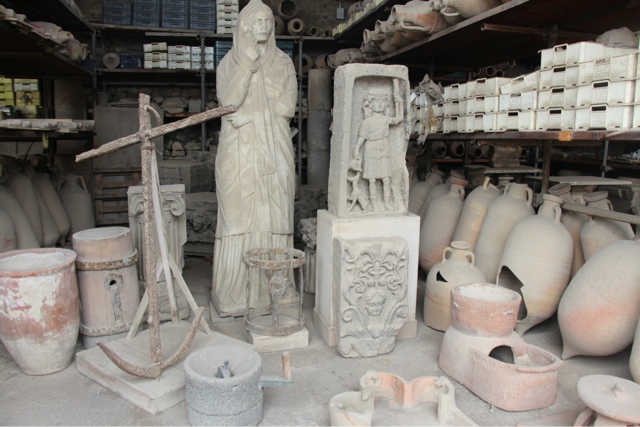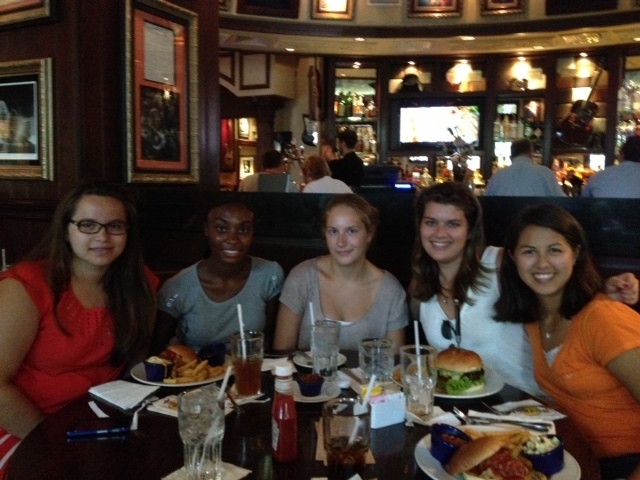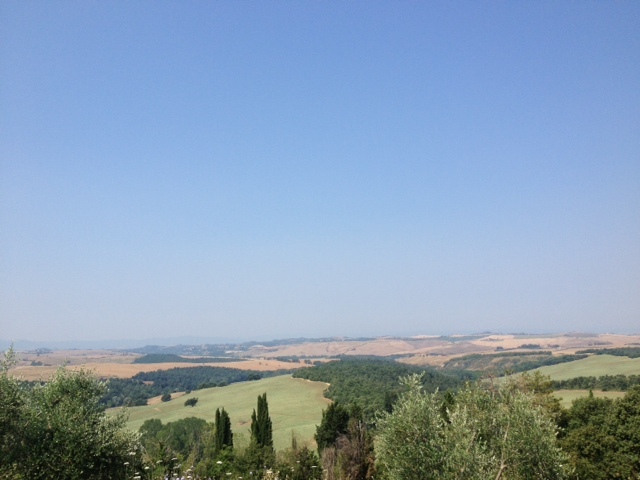It's been awhile since I last wrote, mainly because I've been busy editing and organizing all the photos I've taken on this trip... Following our time in Selinda Camp, we headed to our favorite camp: Duba Plains. To get there from Selinda, you have to take a roughly 35 minute helicopter ride on the smallest helicopter I've ever been on. With our bags piled up to the ceiling on the seat next to me (camera gear and all), it was a miracle we made it to Duba Plains. The helicopter landed in the middle of the bush, very close to a sleeping hippo. To say that was a little nerve-racking would be an understatement! Once in the air and away from the snoozing hippo, the helicopter ride was a beautiful experience (as the chopper can fly lower than the bush planes). We flew over herds of elephants, dozens of water holes, and eventually the beautiful waterways of the Okavango Delta.
 |
| Elephants at a water hole as seen from the helicopter. |
 |
| Entering into the Okavango Delta, taken from the helicopter. |
 |
| Our helicopter landed in the middle of the bush... with a sleeping hippo nearby! |
We stepped out of the helicopter on arrival in Duba Plains and right there, we ran into Dereck and Beverly Joubert again! I could not have asked for a better 23rd birthday present!! We had met them back in January and were hoping they'd be in Duba Plains again, but weren't sure. We were met with hugs from them, our wonderful guide/driver/friend KB, and our lovely friend/lodge manager Annette... Arriving in Duba was like we were arriving at our home. We quickly threw our bags in the room, had a bite to eat, and set off on our first game drive.
The Okavango Delta creates a unique "water in the desert" ecosystem the size of Switzerland. When flooded, it forms floodplains, lagoons, channels and islands that act as a magnet for wildlife. It is one of the world's largest inland river deltas and is so large that it can even be seen from space. The Okavango is home to more than 2,000 plant species, 450 bird species, 65 fish species and countless numbers of large mammals... It truly is one of the greatest wildlife destinations on the earth. Duba Plains is located in the Inner Delta and is one of the most remote camps. It's inaccessible by roads and everything is brought in by either air or boat. On July 26th, we didn't have a set game plan... We just wanted to go with the flow and see what we could find. We came across a group of gorgeous kudu, a type of antelope. Their stripes and coloring help them to camouflage in the bush and when frightened, they often stand still and are difficult to spot as a result.
 |
| Kudu walking in front of our car. |
 |
| Close up of a male kudu. |
We also came across a huge troop of baboons, a species that is definitely under-appreciated on safari. There are 5 species of baboons (olive, yellow, sacred, Chacma and Guinea) that are found in varied habitats. The major overlapping characteristics of any one of their given habitats are abundant water sources and safe sleeping spaces (usually in tall trees or cliff faces). Baboons don't have gripping tails, though they are still able to climb when necessary.
 |
| The baboons ran across the road. Many babies were in this troop! |
In between photographing the baboons, I also photographed this elephant with the reflections of the Okavango Delta waterways. Elephants are native to 37 countries but only approximately 415,000 remain. Nearly 8% of the yearly elephant population is poached at an alarming rate of one elephant per 15 minutes.
 |
| Elephant walking along the waterways. |
Before heading back to camp for dinner after an exciting first game drive, our guide KB spotted the moon rising over a leafless tree. He positioned the car and we waited until the moon was sitting right on top of the tree branches to get this shot...
 |
| Rising moon on July 26. |
Back at camp, we had dinner where two porcupines came to visit. We were treated to a lovely singing performance, and of course I got a birthday cake!
 |
| 23rd birthday in the Okavango Delta. |
The following morning, we set off on a game drive in search of one of the two lion prides in this region of the Okavango Delta. We briefly stopped to photograph some lechwe in the morning light...
 |
| A group of lechwe among the termite mounds. |
Eventually, our guide spotted lions off into the distance. How he saw them? We have no idea... He's THAT amazing. We went off roading until we arrived at the small termite mound where the lions were, of course, sleeping. We waited, and waited, and waited. An hour passed... Another hour passed... Cars came and went... But we stayed. KB insisted that the lions would get up soon so we stayed, determined to see these lions in action. We talked about the animals of the Delta and photographed birds flying overhead as we waited for the two lionesses and older male lion to move but by now, we were getting pretty hungry. We had woken up at 6am and had only drank coffee and ate some biscotti (as we always take a bush breakfast with us in the car). We couldn't unpack the breakfast with the lions right there, so we'd have to drive to another location. We decided that we would quickly eat and then return to the lions. I kept thinking to myself "the lions will probably get up and move the second we leave" so as we headed off towards the breakfast location, I kept looking back... until I saw the lioness stand up. We turned the car around, and sure enough... the lions were finally waking up!
 |
| An elephant photobombs my lioness portrait. |
 |
| Lioness waking up from a nap. |
After several yawns, the lions were finally on the move. We followed alongside them as they headed to the breakfast spot where other guests were eating. Stomachs grumbling with hunger, we happily followed the lions as they proceeded to (unsuccessfully) stalk warthogs. The whole time we were following them, the other guests remained seated at breakfast. The lions were crossing over the water, trudging through mud and jumping across shallow waterways.
 |
| This male lion was following the females in hopes of getting their food. |
The lionesses walked out in the open, with the lechwes carefully watching. Since the lechwes knew the lionesses were there, the lionesses lost the element of surprise and didn't even bother with stalking them. The warthogs and lechwes in another location, however, didn't know the lions were there until monkeys up a tree started barking an alert... resulting in a failed hunting attempt on a group of warthogs.
 |
| The lionesses would split up in different directions to try to cut off their prey. |
 |
| Lioness jumping over a shallow waterway. |
With a failed hunting attempt and the sun coming out, the lions stopped to rest under the shade of a tree. At this point, we were starving so KB hopped out of the car... with the lions right there... and pulled out our breakfast basket. We sat eating our eggs, muffins, bread with fig jam, and fruit while watching the lions lazily go back to sleep. Of course, we had coffee too!
 |
| Breakfast picnic in the car. |
In the afternoon, we mainly photographed birds (pics further down) even though we were trying to find the lion cubs early on. Birds are often overlooked on safari, but there are so many beautiful species everywhere you look! We did make it to the lion cubs, but just as the sun was setting so it wasn't the best light. But, you have to make the best out of any situation and I was able to get a few shots of the cubs playing with an adolescent male.
 |
| Lion cub playing with an adolescent male. |
 |
| Adolescent male stuck on babysitting duty while the mother of the cubs was away. |
On the way back to the lodge, we stopped to admire the rising moon. The sky lit up with hues of pink and purple... a perfect gradient of relaxation.
 |
| Rising moon on July 27th. |
On the morning of the 28th, we set off to find the lion cubs once more. We drove past herds of lechwes running across the road and stopping in the dust they had kicked up.
 |
| Amidst the dust, lechwes stop to look around. |
Instead of finding the cubs, we came across the same two lionesses and male lion we saw the previous day. This time, there was also an adolescent male following the lions. He wanted to meet up with the females, but the older male wouldn't let him get too close. Any time the adolescent male got too close, the older male would charge at him, prompting the adolescent male to sit down in a submissive state. At one point, the two males were fighting... Likely, the adolescent male was testing the older male's strength.
 |
| The two lionesses crossing the water. |
Because the lions hadn't made a kill yesterday, they were quite hungry. Once again, we watched the lionesses stalk warthogs. This time, they got one. Unfortunately for them, the older male lion came charging immediately and stole their kill for himself. The two lionesses nuzzled each-other in what appeared to be frustration, as the male continued to suffocate the warthog and as he dragged it around the corner to begin eating.

While he was distracted with the kill, the adolescent male finally joined up with the females. The three rested in the shade, hoping that the older male would leave a little meat for them. While it pleased the staff to see the adolescent male join up with the females, the sad reality is that if the lionesses made another smaller kill he would steal their food just as this older male had. When lionesses kill larger animals, however, the males will share the food. With this dynamic, it's a miracle these lionesses are able to survive in this environment. Lions are the most endangered of Africa's three big cats. There are only six lion populations in Africa (the Okavango Delta lion population being one of them) that are sufficiently protected to hold at least 1,000 lions (the conservation gold standard for guaranteeing the long-term survival of the species).
With the lions waiting for the male to finish, there was no chance of any more action for hours... Likely until the late afternoon. So, we continued on to find jackals fighting with one another.
 |
| A jackal with his hair puffed up. |
 |
| Two of the four jackals. |
After observing them chasing each-other, we found a nice tree to have our breakfast under. That's when we had some unexpected guests... a herd of elephants! These gentle giants came closer and closer until they were only a few feet away from where we had set up breakfast on the hood of the car. To ensure their safety and ours, we moved slowly and talked softly. You're in the animals' territory... the wild. And the wild is unpredictable. But if you respect nature, nature will often respect you and that was exactly the case here. The elephants seemed very relaxed as they strolled past, munching on trees as they went. Eventually, they were out of sight and we were alone in the bush once more.
On our last afternoon game drive, we set off in search of the lion cubs which we did not find. We were treated to beautiful lechwe sightings in the water, however. At one point, a warthog started running and startled them, prompting the lechwes to scatter into the water at full speed.
 |
| The lechwe split up in different directions, running at full speed. |
 |
| A lone lechwe leaps across the waterways. |
As mentioned previously, the birding in the Okavango Delta is fantastic. Throughout our drives, we stopped to admire various species. Below are some of the highlights.
 |
| A martial eagle flying above the lionesses when they were sleeping. |
 |
| A lone bird sits atop a termite mound. |
 |
| My favorite bird, the lilac breasted roller, sitting close to the ground. |
 |
| Another roller |
 |
| Bee eaters sit on a leafless tree. |
 |
| Pied kingfisher on a lone pole on one of the bridges. |
 |
| African fish eagle in flight. |
 |
| Fishing for food at sunset. |
 |
| Owl during a night drive. |
When it was time to say goodbye to Duba Plains, we were beyond sad. This place has become a home for us, even though it was only our second visit. Duba Plains has developed a wonderful model that creates maximum benefit for the nearby community, a partnership that ensures these communities receive tangible and substantial benefits from wildlife conservation. This 77,000 acre private reserve is a conservation success story that we have become involved with. If it were up to me, we'd never leave!! Here's a quick tour of camp...
 |
| Our number 5 tent. |
 |
| The inside of the tent features a living room and the whole room looks over the Okavango Delta. |
 |
A small desk area featuring Beverly Joubert's photograph.
|
 |
| Mosquito nets surround the beds. |
 |
| A bath tub with a view! From this "window", we could often see a bushbuck right outside our outdoor shower. |
 |
| Outside exercise area. |
 |
| Small private plunge pool out on the deck. |
It's impossible to describe, but the camp is magical. From the staff to the views to the food to the amazing lodge, this place is magical.
 |
| Campfire area overlooking the Okavango Delta. |
I'd like to take a minute to say a HUGE thank you to Annette and KB for yet another wonderful stay at Duba Plains. We know we will see you again!
 |
| Me, KB, mom and Annette on the morning of our departure. |
While my Africa journey was unfortunately cut short, it's never a goodbye... It's merely a "see you later". In fact, I am already planning to return next summer. Thanks for reading about my African adventures... Stay tuned for what's to come and be sure to hit the subscribe button to be notified of new posts! As always, follow my instagram @elissatitle for more pics.























































Comments
Post a Comment